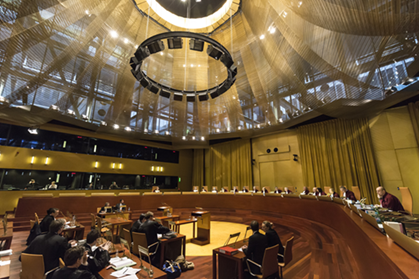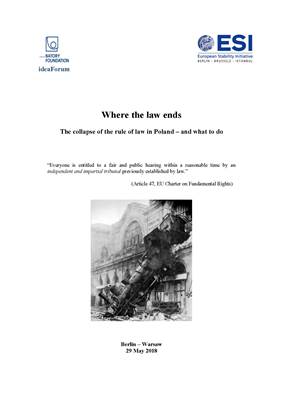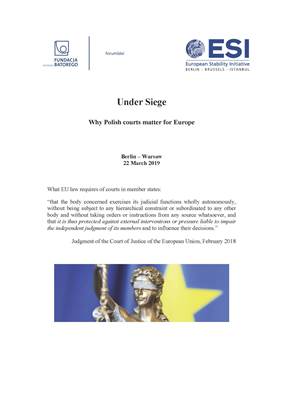5 billion to save the EU – Poland, Penguins and the Rule of Law
The rule of law requires that “even the guardians of the law are obeying the law … If you maltreat a penguin in the London Zoo, you do not escape prosecution because you are the archbishop of London.”
Tom Bingham, The Rule of Law
- The battle over the rule of law
- Why there will be no compromise
- The way forward – a € 5 billion sanction
- Turning point for Europe
Dear friends,
On 15 July, the European Court of Justice (ECJ) in Luxembourg issued a historic judgement. It refers to a “structural breakdown” of the Polish judiciary, which
“no longer makes it possible either to preserve the appearance of independence and impartiality of justice and the trust which the courts must inspire in a democratic society or to dispel any reasonable doubt in the minds of individuals.”
The ECJ confirmed what many, including ESI, have described in numerous detailed reports: Poland has become a test case today whether it is possible to create a justice system in an EU member state without independent courts, where judges can be rewarded and punished by their government for the content of judicial decisions.
In such a situation the right to a fair trial can no longer be guaranteed. The trust required for courts in other EU member states to accept the judgements of Polish courts dissolves. When national judges are punished for turning to the ECJ for guidance on how to apply EU law, as happens in Poland, the European legal system is destroyed. Across the EU national courts respect and implement the judgements of courts in other member states, whether these involve commercial disputes, the European arrest warrant or child custody. This trust between courts makes possible the “free movement of judicial decisions.” Without such trust neither the creation of a single market nor the abolishment of internal frontiers would have been possible. Koen Lenaerts, the 66-year-old Belgian president of the ECJ, put it bluntly in early 2020: “without judicial independence, remedies grounded in EU law become a paper tiger.” The dialogue between independent national courts and the ECJ is, according to Lenaerts, “the keystone of the EU system of judicial protection.” And without a keystone buildings collapse.
Until recently, Lenaert wrote, it was assumed that upon joining the EU, states, “will remain committed to defending liberal democracy, fundamental rights and a government of laws, not men. Recent developments show that this assumption cannot simply be taken for granted.”

The keystone of legal protection in the EU: independent national courts
Read: Koen Lenaerts, New Horizons for the Rule of Law within the EU.
The battle over the rule of law
There has also been no similar breakdown anywhere else in the EU, including in Hungary, with which Poland is often lazily paired. And no minister of justice in the EU has ever concentrated as much power in his hands as Poland’s Zbigniew Ziobro, the architect and biggest beneficiary of the breakdown of the rule of law in his country.


ECJ president Koen Lenaerts vs. minister of justice Zbigniew Ziobro
Ziobro quickly declared that he would rather fight the ECJ and ignore European treaties than give up control. As he put it on 21 July, these recent ECJ rulings “are not binding for the Polish authorities who act based on the Polish constitution. Submission to these rulings would be blatantly unlawful.” It is naïve to expect that a Polish government with him as minister will implement the judgement.
NEW Inside the system Ziobro built
ESI Background Paper
It is equally unreasonable to believe that the ECJ will accept a few cosmetic corrections or “some kind of accord”, as recently suggested by the Polish prime minister. Cosmetic steps and fake compromises cannot restore trust in the independence of Polish courts and would not address the deep problems recognised by this judgement.
The highest court of the European Union has been preparing for this showdown for years. It has developed its legal ammunition in seminal judgements starting in February 2018. As two leading experts described, the ECJ has built “brick-by-brick, a renewed set of principles and standards to help EU institutions and national courts more effectively to defend the rule of law.” The 15 July ECJ judgement is clear about what is required. It made four key points:
Point 1: The rule of law is a fundamental value, expressed in Article 19 of the Treaty of European Union.
“A Member State cannot, therefore, amend its legislation in such a way as to bring about a reduction in the protection of the value of the rule of law, a value which is given concrete expression by, inter alia, Article 19 Treaty of European Union.”
Point 2: Independent courts are of cardinal importance for the rule of law.
“That requirement that courts be independent, which is inherent in the task of adjudication, forms part of the essence of the right to effective judicial protection and the fundamental right to a fair trial, which is of cardinal importance as a guarantee that all the rights which individuals derive from EU law will be protected.”
Point 3: Rules governing courts must dispel any reasonable doubt about their independence.
“the guarantees of independence and impartiality required under EU law presuppose rules, particularly as regards the composition of the body and the appointment, length of service and grounds for abstention, rejection and dismissal of its members, that are such as to dispel any reasonable doubt in the minds of individuals as to the imperviousness of that body to external factors and its neutrality with respect to the interests before it.”
Point 4: Disciplinary systems must NOT be used to control the content of judgements.
“As regards specifically the rules governing the disciplinary regime applicable to judges … that regime must provide the necessary guarantees in order to prevent any risk of its being used as a system of political control of the content of judicial decisions."
The ECJ also made five concrete demands:
Demand 1: guarantee the independence of the new disciplinary chamber
Demand 2: stop the abuse of disciplinary procedures to control the content of judgements
Demand 3: create a robust and predictable disciplinary regime
Demand 4: stop the abuse of this regime to harass judges the ministry of justice does not like:
Demand 5: end pressure to stop judges turning to the ECJ (to request “preliminary rulings”)
Now the battle is joined. Europe’s leading judges have both the law and EU history on their side.
Why there will be no compromise
The determination of the Polish government to bring the judiciary under its direct control by any means available is by now beyond doubt. And yet some observers still fail to grasp the strategy of the Polish government. We have been here before.
The anglophone ex-banker Mateusz Morawiecki, who became Polish prime minister in December 2017, has been a master at the diplomatic game of pretending to negotiate without making concessions on any issue of substance. In January 2018, Morawiecki met then Commission President Jean Claude Juncker. Juncker declared that he looked forward to “making progress by the end of February.” On 14 February 2018 Juncker repeated: “I think there is a good chance the Polish positions will move toward ours.”
There was no progress. Nothing was settled. A new disciplinary system to control judges and undermine the separation of powers was being constructed at high speed.
On 22 March 2018, the Polish prime minister was blunt: “The essence, the most important elements of the reform remain untouched. At the same time, we are looking at what would allow the other side to say: Oh, one can reach a compromise with Poland.” On 3 April 2018 Juncker announced that he viewed promises of concessions by the Polish government “with a lot of sympathy.” The Polish Secretary of State for EU affairs told a German radio on 3 April 2018: “We make a concession regarding issues which do not play any central role in the judiciary system.”
In early May 2018, the Financial Times and other international media wrote that “Poland offers fresh concessions to the EU over legal reforms.” They referred to “concessions” presented by the Polish government on 22 March. But there were no concessions. Foreign Minister Jacek Czaputowicz was admitted this at the time, explaining on 4 May 2018: “We want to show some openness to the Commission’s demands in order to close this case and deal with other important European matters like the budget.” And in a speech delivered on 11 November 2019 President Andrzej Duda attacked the (at the time still) critical judges of the Supreme Court and then declared: “We will sit them out.”
This is precisely what happened. As a result, when the ECJ came to deliver its ruling last month, this was what it was dealing with:
- a National Judicial Council, responsible for nominating judges, consisting of 25 people, the vast majority of whom were members of, or were appointed by, the ruling party; and
- a disciplinary system in which the Minister of Justice directly or indirectly appoints every single person involved in the investigation, prosecution, and adjudication of disciplinary charges against judges.
The way forward – a € 5 billion sanction
Negotiations will not work, nor are they necessary. The EU is not powerless: the Treaties themselves offer a way forward.
On 20 July, European Commission Vice-President Vera Jourova, determined to see the ECJ judgement implemented, set a deadline: “we will ask for financial sanctions if Poland does not remedy the situation by 16 August. The rights of EU citizens and businesses must be protected in the same way across all Member States. There can be no compromise on this.”
The option of imposing financial sanctions if ECJ judgements are not implemented has existed since 1993. The ECJ has imposed such sanctions 37 times.
EU law gives the Commission the right to propose any financial sanction. It also gives the ECJ the right to decide the appropriate fine, whatever sum it sees fit. While the amount of these sanctions has usually been modest, based on a formula the Commission developed in 2005, this formula is not binding, and the EU treaty does not set an upper limit. The Commission’s guidelines state that the aim must be to “ensure that the penalty itself is a deterrent to further infringement” and provide for exceptional fines “where appropriate in particular cases.”
NEW How infringement penalties are set – the case for 5 billion
ESI Background paper
There has never been an infringement case of similar importance for the EU legal system and for the survival of the rule of law. This justifies a sanction unlike any in the history of the EU. The Commission and the ECJ could do so based on an Article 19 principle:
Every time the ECJ finds that the right to “effective legal protection” through national courts, which Article 19 of the EU treaty guarantees, is violated by member states, and these do no not remedy the situation, a financial sanction shall be imposed that is at least 1 percent of the GDP of the country annually.
In the case of Poland, which has a GDP of about € 520 billion, this would amount to a fine of some € 5.2 billion annually. The Commission should therefore propose, and the ECJ impose a fine of € 880 million every two months until the Polish government implements the 15 July ruling. If the Polish government commits to fully implementing this judgement before 16 August, and to abandon its quest to control its judges, there would be no financial sanction.

Grand Chamber, European Court of Justice, Luxembourg
Turning point for Europe
This is a huge opportunity for both Poland and the EU. It would restore the separation of powers in Poland. Implementing the 15 July ECJ ruling would end the prospect of a legal Polexit and restore trust in Polish courts across the EU.
Enforcing an Article 19 principle would strengthen the EU legal system for the next generation. No EU member state should ever again be tempted to destroy the independence of its courts. Nor should any state ever be tempted to ignore judgements on such a grave issue from the ECJ. This would be a positive turning point in EU history. As Koen Lenaerts put it in early 2020:
“Today, Europeans are facing a defining moment in the history of integration … the principle of judicial independence must be preserved so that the EU remains a “Union of democracies,” a “Union of rights,” and a “Union of justice.” If the next generation of Europeans is to explore new horizons for an ever-closer Union where citizens may continue to enjoy a sphere of individual liberty free from public interferences, integration through the rule of law is the only way forward.”
Yours sincerely,

Gerald Knaus
Twitter: @rumeliobserver
Further reading
"The Court of Justice of the European Union shall include the Court of Justice, the General Court and specialised courts. It shall ensure that in the interpretation and application of the Treaties the law is observed.
Member States shall provide remedies sufficient to ensure effective legal protection in the fields covered by Union law."
Worth reading: The 15 July 2021 ECJ judgement on Poland
A strong essay by Koen Lenaerts on what is at stake: New Horizons for the Rule of Law within the EU (2020)
An excellent overview of recent developments by two leading experts, Laurent Pech and Dimitry Kochenov: Respect for the Rule of Law in the Case Law of the European Court of Justice: A Casebook Overview, May 2021
Read also Laurent Pech, Patryk Wachowiec and Dariusz Mazur: Poland’s Rule of Law Breakdown: A Five-Year Assessment of EU’s (In)Action, 2021
A must-read classic: Tom Bingham, The Rule of Law, 2011

ESI analysts Katharina Schuchmann and Magdalena Milenkovska
working on the Rule of law in Poland (Berlin, July 2021)
NEW ESI: Inside the system Ziobro built (August 2021)
NEW ESI: How infringement penalties are set – the case for 5 billion (August 2021)
ESI and Batory: On the breakdown of the legal system in Poland (May 2018)
Reactions to ESI and Batory advocacy on taking Poland to the ECJ

ESI Brainstorming on the rule of law in Poland, November 2019
ESI and Batory: On the need to take the Polish disciplinary regime to the ECJ (March 2019)
ESI: On the need to confront the illiberal system Ziobro built (December 2019)
Gerald Knaus in Der Spiegel "Diesmal geht es um alles" – über Rechtsstaatlichkeit in Polen (July 2021)
Gerald Knaus in Der Spiegel über EU-Geld die Krise der Gerichte in Polen (April 2020)
Gerald Knaus in Die Welt zu Polen – "Eine Entwicklung viel gefährlicher als der Brexit" (Oktober 2020)

ESI Senior Fellow John Dalhuisen working on the role of the ECJ
NEW: ESI 70 years refugee convention – what now? (July 2021)
NEW Rumeli Observer: 22 years of ESI – looking back (July 2021)
NEW Rumeli Observer: Gerald Knaus and Jean Asselborn on refugees and EU borders (July 2021)
NEW Debate on Azerbaijan and corruption with German MP Frank Schwabe (July 2021)
The European Stability Initiative is being supported by Stiftung Mercator



